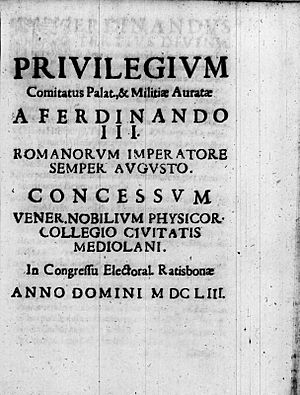Privilege (law) facts for kids
A privilege is a special advantage or benefit given to a certain person or group. It means they get to do something or are protected in a way that others are not. This special treatment can come from the government or another powerful group. Sometimes, a privilege is given because of who you are, like being born into a certain family. Other times, it's given based on certain conditions.
For example, owning a piece of land or having a special license to drive a taxi are types of privileges. These can be transferred to someone else. But they can also be taken away if certain rules are broken. In countries where people vote for their leaders, a privilege is usually given after you are born. It often depends on what you do or achieve.
Contents
What is a Privilege?
The word "privilege" comes from an old Latin term, privilegium. This term means a "private law." It refers to a rule that applies only to a specific person or a specific group. It does not apply to everyone.
Privilege vs. Right
It's important to know the difference between a privilege and a right. A right is something that all people have just because they are human. It's something that cannot be taken away. For example, the right to speak freely or the right to be treated fairly are usually seen as basic human rights.
On the other hand, a privilege is not something everyone has. It's a special benefit that is given to some. It can also be taken away. Think of it this way: everyone has the right to an education. But having a special parking spot reserved just for you might be a privilege.
Historical Examples of Privileges
Throughout history, many groups of people had special privileges. These often gave them more power or made their lives easier.
Privileges in the Church
Long ago, some religious groups or leaders received special privileges. For example, the abbey of Fulda was a very important religious center. Its leader, the abbot, was given a special privilegium by the Pope. This meant the abbot could talk directly to the Pope. He did not have to go through the local bishop first. This gave the abbey more power and independence.
The French Revolution and Privileges
One of the main goals of the French Revolution was to get rid of privileges. Before the revolution, society in France was divided into different social classes. These classes were the nobility (rich families with titles), the clergy (church leaders), and the ordinary people. Each group had its own set of laws and special benefits.
- The nobility and clergy often did not have to pay certain taxes.
- They had special rights in courts.
- They held most of the important jobs.
The ordinary people, however, had few privileges. They had to follow strict laws and pay many taxes. The people who led the French Revolution wanted everyone to be equal under the same laws. On August 4, 1789, a group called the National Constituent Assembly officially ended these old privileges. This was a big step towards making everyone in France equal.
See also
 In Spanish: Privilegio para niños
In Spanish: Privilegio para niños
- Executive privilege
- Parliamentary privilege
- Privilege (canon law)
- Privilege (evidence)
- Privilège du blanc
- Privilege of peerage
- Privilege (social inequality)
- Szlachta's privileges


